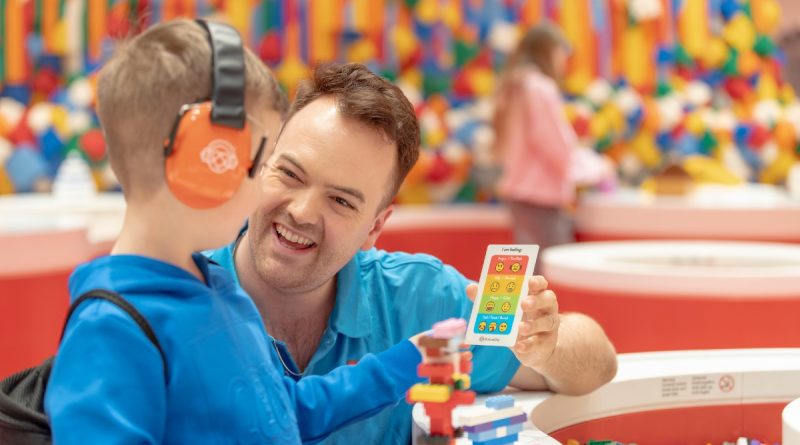LEGO announces Store and House initiatives for Autism Acceptance Month
The LEGO Group and LEGO Foundation have announced multiple initiatives coming to LEGO Stores, the LEGO House and more to mark the start of World Autism Acceptance Month.
April 2 is World Autism Awareness Day, as recognised and sanctioned by the United Nations, and has gradually grown from a day to a week to a month within many countries and organisations. The goal is to encourage UN member states to raise awareness of autism, although some autism rights groups have advocated for the term ‘autism acceptance day’ to directly tackle prejudice against autistic people rather than only increase awareness.
The LEGO Group has latched on to that terminology as it announces a range of long-term initiatives intended to ‘support and celebrate neurodivergent children and adults’, which will encompass sensory inclusion at LEGO Stores and the LEGO House, changes to the LEGO Life magazine, and grants for LEGO Foundation partners to develop programmes that support neurodivergent children and their families.

“All LEGO entities are united by our mission to inspire and develop the builders of tomorrow and a belief that the benefits of play are equally critical to all children,” said the LEGO Group’s Chief Commercial Officer Colette Burke. “This fuels our exploration of how to make the LEGO experience more inclusive and welcoming for everyone. We know the LEGO System in Play is enjoyed by neurodivergent fans of all ages and we want to support, inspire, and celebrate their creativity.
“We hope that the changes to our stores, publications and family attractions will have a positive impact and help embrace the diverse needs and strengths of our fans globally. There will always be more to do, and we’re committed to working with fans and experts to implement initiatives that can help make a difference in building a more inclusive world.”
All LEGO Stores across North America will this month be certified as ‘Sensory Inclusive’ by KultureCity, a non-profit organisation that promotes accessibility in public spaces for individuals with non-visible disabilities and specific sensory needs. The certification is only awarded to venues that provide a satisfactorily inclusive experience, both through support tools and staff training.

The certificate is designed to reassure guests that staff have the necessary training to accommodate neurodivergent visitors, and guarantees that sensory bags – containing items such as visual cue cards, noise-reducing headphones, fidget tools and more – will always be available to those who need them at no additional cost. The LEGO House already has this certification, and the LEGO Group aims to expand it to LEGO Stores in countries beyond North America later this year.
“When I’m in a crowded place or noisy area, I feel nervous,” said 11-year-old Isabella. “The [noise-reducing] headphones really help well because it just cancels out most loud noises. It gives me a little bit less stress. If there’s someone really close to me and I feel like I’m really nervous, I’ll just pop a fidget out and just play with it to calm myself down.
“I like having [noise-reducing] headphones and fidgets in the LEGO Store because it’s just going to make me feel really more welcome.”

Isabella’s mum Samantha added: “When I heard about this project, I just beamed. I was so excited. I’ve been waiting for this – to just be able to go to the store, where the employees understand, and the store is ready for my child. It’s exciting. Having KultureCity involved gives me so much confidence that my child will enjoy the experience and the sensory bags will make us come to the store more often.”
Neurodiversity organisation Special Networks has also reviewed two years’ worth of issues of the LEGO Life magazine to find ways to make it more welcoming for neurodivergent readers. Several of its recommendations have already been implemented in the latest edition (Issue 2, 2024), including numbering comic panels to make them easier to follow and maintaining consistency in placement of visual cues (such as prompts for activity answers).
Finally, the LEGO Foundation has announced the five organisations it’s partnering with through its Play For All Accelerator Programme, which is focused on supporting inclusive learning through play. The scheme will see grants of up to £2.09 million awarded to Social Cipher, a story-focused video game platform; Kokoro Kids, an early-learning platform to help kids develop cognitive and emotional skills; Mom’s Belief, a care provider for neurodivergent children; onebillion, which provides adaptive literacy and numeracy software for marginalised children; and Little Journey, an app intended to reduce anxiety around healthcare situations.
Head over to the LEGO YouTube channel to find a series of short films featuring autistic creators, including Canadian pencil artist Casey ‘Remrov’ Vormer, Japanese artist Gaku and U.S. LEGO builder Allyson Gail.
Support the work that Brick Fanatics does by purchasing your LEGO using our affiliate links.
Author Profile
- I like to think of myself as a journalist first, LEGO fan second, but we all know that’s not really the case. Journalism does run through my veins, though, like some kind of weird literary blood – the sort that will no doubt one day lead to a stress-induced heart malfunction. It’s like smoking, only worse. Thankfully, I get to write about LEGO until then.
Latest entries
 News19/09/2024LEGO Star Wars 40755 Imperial Dropship vs. Rebel Scout Speeder review
News19/09/2024LEGO Star Wars 40755 Imperial Dropship vs. Rebel Scout Speeder review March 2025 sets19/09/202415 LEGO Speed Champions sets rumoured for 2025
March 2025 sets19/09/202415 LEGO Speed Champions sets rumoured for 2025 May 2025 sets19/09/2024More details on rumoured LEGO Star Wars 2025 Jango Fett and Chopper sets
May 2025 sets19/09/2024More details on rumoured LEGO Star Wars 2025 Jango Fett and Chopper sets News19/09/2024LEGO is considering abandoning physical instructions
News19/09/2024LEGO is considering abandoning physical instructions





